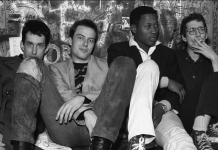Originally published on February 6th, 2019 on Open Culture
Seems there was a time when the dominant story of punk was the story of British punk. If you knew nothing else, you knew the name Sid Vicious, and that seemed to sum it up. Maybe it was only in the mid-nineties, around the time Legs McNeil and Gillian McCain released Please Kill Me: the Uncensored Oral History of Punk that more people began to popularly understand the lineage of late sixties garage rock, the Velvet Underground, Detroit’s Iggy and the Stooges, and the early CBGB scene in the mid-seventies crowned by the sound of The Ramones, Patti Smith, Blondie, and Talking Heads.
Now even that story can seem oversimplified, sketched out in brief on the way to discussing the literary triumph of Patti Smith, cultural interventions of David Byrne, career highlights of punk power couple Debbie Harry and Chris Stein, or the many, always fascinating doings of Iggy Pop.
The Ramones roared back into fashion twenty years ago, and the demise of CBGB in 2007 brought on waves of marketing nostalgia of almost Disney-like proportions. Most everyone who pays attention to pop culture now knows that late-seventies punk wasn’t a movement that arrived out of nowhere, bent on destroying the past, but a continuity and evolution of earlier forms.
But the Trash Theory video at the top reaches back even earlier than garage bands like the Monks and the Sonics—typically cited as some of the earliest common ancestors of punk and rock and roll. Punk was “rock and roll bored down to its bare bones,” says the narrator, and begins with a rockabilly artist who called himself The Phantom and tried to outdo Elvis in 1958 with the raucous single “Love Me.” The Phantom himself may not have embraced the label at all, but like Link Wray, he was still something of a proto-punk. Wray’s raunchy, gritty instrumental “Rumble,” also released in 1958, inspired huge numbers of guitarists and aspiring musicians, including young Iggy Pop, who cities it as a primary reason he joined a band.
From there, we’re on to “elemental” tracks like The Kingsmen’s “Louie Louie,” The Trashmen’s “Surfin’ Bird,” The Sonic’s “Psycho,” The Monk’s “I Hate You,” and Love’s “7 and 7,” all clear progenitors of the sound. And the Mysterians, of garage classic “96 Tears,” were the first band to be described as punk by the mainstream press. The Kinks and The Who set templates in Britain while the Velvets perfected sleazy, experimental noise back in New York. The MC5 in Detroit helped bring us The Stooges. The Modern Lovers’ 1972 “Roadrunner” launched hundreds of bands.
The video is a convincing short history showing how punk arose naturally from trends in the late 50s and 60s that clearly pointed the way. Like every such history, especially one undertaken in the span of fifteen minutes, it leaves out some pretty heavyweight figures who should have a central place in the narrative. Irritated YouTube commenters have pointed out lapses like The New York Dolls (see them further up in 1973), without whom there would have been no Sex Pistols. (Proto-punk Detroit band Death does get a mention, though their influence is negligible since they went mostly unheard until 2009.)
Also needing inclusion as early punk pioneers are Television (check them out in ’78) and Richard Hell and the Voidoids (above in 1980’s Blank Generation). And these are just a few missing New York bands. Any devotee of this musical history will come up with a dozen or so more from both sides of the Atlantic who deserve mention in the early history of punk. And that’s why, I guess, that popular history keeps getting told and retold. As soon as it starts to get stale, it seems, there’s always more to add.
Related Content:
The History of Punk Rock in 200 Tracks: An 11-Hour Playlist Takes You From 1965 to 2016
Punking Out, a Short 1978 Documentary Records the Beginning of the Punk Scene at CBGB’s
Josh Jones is a writer and musician based in Durham, NC. Follow him at @jdmagness










